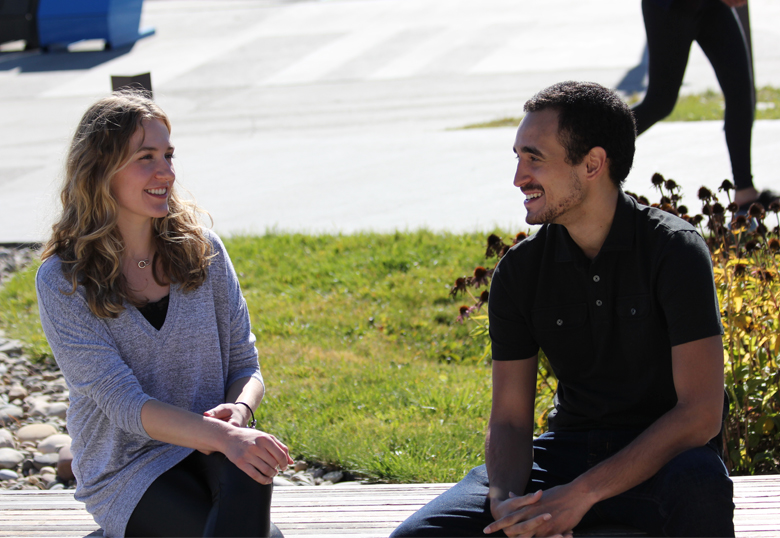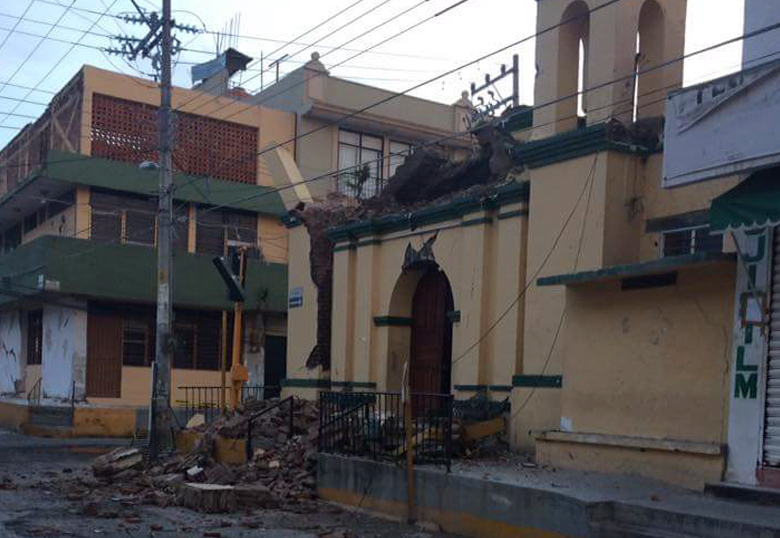After experiencing the earthquake that Mexican authorities have called the largest in the country in 100 years, two University of Lethbridge students know the devastation it caused and hope to bolster their own donations to recovery efforts by encouraging others to make a donation, however big or small.
The shaking and vibrating that caused concrete to move like liquid made Lanna Petterson (BA ’12; MSc ’15) and Francisco Gomez Jimenez, both doctoral students under the supervision of Dr. Paul Vasey, think they were being bombed. The magnitude-8.1 earthquake struck around 11 p.m. when they were in their hotel rooms for the night. Petterson and Gomez Jimenez were in Juchitán, Oaxaca working on their research projects. They had arrived on Aug. 23 and their data collection was nicely underway when the earthquake hit.
“It was terrifying,” says Gomez Jimenez. “I was in my room and preparing to go to sleep. I felt a small shake. I thought ‘This is just a small one; it will pass.’ But then it just got worse and worse and the whole building started moving from side to side. I just panicked. I didn’t know what to do. For me, the worst part was how it sounded — like we were being bombarded.”

“I was in bed and all of a sudden the room started shaking. Your brain almost can’t process what’s happening,” says Petterson. “I kind of figured it was an earthquake but then the whole room was shaking, you hear this loud banging, you hear dogs barking outside. You can’t really make sense of what’s going on. I didn’t know if the building was falling or what was happening.”
“I went to the corner of the room, braced my arms against the walls and looked at the ceiling. It was going side to side and looked like it was going to break and collapse at any point,” says Gomez Jimenez. “I don’t know how long it lasted. It felt eternal to me. Eventually, the sound was less intense and the lights went out. I ran downstairs from the third floor. The first thing I saw, fortunately, was my colleague. All the people from the hotel were in the lobby.”

With no power, shelter, food or water, the pair decided the best course of action was to return to Canada, even though the decision was an agonizing one. They wanted to stay and help but also didn’t want to be an additional burden or take supplies away from those who really needed them.
“The next day in Mexico City there were donating centres so we filled a cart full of supplies. Still, they need all the help they can get,” says Gomez Jimenez. “Right now, we are donating what we can to the people in Juchitán, especially of course to friends of ours who need help. It’s difficult to put yourself in a situation like this but every little bit that you donate helps. That’s what people in these places need to feel — that they’re not alone, that people are thinking about them and that they’re willing to help.”
“Donating to the Red Cross or other organizations that are helping in Mexico and the different relief efforts that are going on in several countries that have experienced massive devastation recently is the best way to help,” says Petterson.

Back in Canada, Gomez Jimenez didn’t have long to relax before Hurricane Maria tore through his homeland of Puerto Rico.
“Puerto Rico is devastated,” he says. “Friends keep sending me pictures and videos and it just looks so bad. My friends and relatives are OK fortunately, but a lot of people are not. Other people lost their houses. I did feel bad about leaving Juchitán, which is why I want to go back to Puerto Rico and help however I can.”
His mother was on a business trip in Brazil when the hurricane hit and she has been unable to get a flight back to Puerto Rico. Many people are staying in refugee centres.
“I’m hoping I’m able to get there. After everything that has happened, I just need to see my family now. Earthquakes, hurricanes, it’s just a little too much,” he says, adding one of the communication towers at the airport was damaged so that’s why flights have been hampered.
“Even before this, we were in an economic crisis. There’s a huge debt and I’m sure this is going to make it a lot worse.”
Gomez Jimenez encourages anyone who’d like to help people in Puerto Rico to donate to their preferred disaster relief agency.
